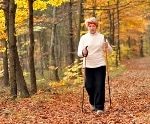Public Imperative: Walking Six Miles Each Week Could Be a Neurology Marketing Concept to Fight Dementia with Brain Power

Magic Number: Six Miles per Week
The results of a research study reported in the Journal Neurology suggest that adults who walk six to nine miles each week may benefit from improved memory and brain function in late adulthood. We could see physical activity programs emerge in neurology marketing.
The study involved about 300 people in Pittsburgh who tracked their weekly walking habits for researchers. Testing over a period of more than a dozen years showed that individuals who walked between six and nine miles each week had less age-related brain shrinkage than people who walked fewer miles.
The lead researcher, Kirk Erickson of the University of Pittsburgh, said in news reports: “Brain size shrinks in late adulthood, which can cause memory problems. Our results should encourage well-designed trials of physical exercise in older adults as a promising approach for preventing dementia and Alzheimer's disease."
“If regular exercise in midlife could improve brain health and improve thinking and memory in later life, it would be one more reason to make regular exercise in people of all ages a public health imperative," Erickson said.
Using MRI on 299 older adults, the authors examined the association between gray matter volume, physical activity, and cognitive impairment. Greater amounts of walking were associated with increased gray matter volume, an effect that may reduce the risk for dementia, according to the study.
Published reports said they studied volunteers who were free of dementia and who kept track of how much they walked. Nine years later, scientists took brain scans to measure their brain volume. After four more years, they tested to see if anyone in the study had cognitive impairment or dementia.
They found that people who walked roughly six to nine miles a week halved their risk of developing memory problems. They said more studies need to be done on the effects of exercise on dementia, but in the absence of any effective treatments for Alzheimer's, walking may be one thing people can do that may help them down the road.
Incorporating neurology marketing strategies into public health campaigns could further promote the benefits of regular physical activity for brain health. This approach could help raise awareness and encourage more people to engage in activities that support cognitive function and potentially reduce the risk of dementia.
See how Healthcare Success transforms doctor marketing by generating exposure and increasing qualified leads!
Ref: Erickson et al. Neurology 2010; 75: 1415-1422
Related Articles:
A Fresh Look at the 7 Ps of Healthcare Marketing
7 Insightful Tips for Better Healthcare Marketing Direct Response Results
The Future of Healthcare Marketing and Digital Dominance









